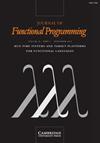从Coq中提取功能程序,在Coq中
IF 1.1
3区 计算机科学
Q4 COMPUTER SCIENCE, SOFTWARE ENGINEERING
引用次数: 2
摘要
摘要我们基于MetaCoq的认证擦除实现了将Coq程序提取到函数语言中。我们用类型信息扩展了MetaCoq擦除输出语言,并将其用作中间表示,我们称之为${\lambda ^T_\square}$。我们用一个完整的管道来补充提取功能,该管道包括以证明生成方式实现的几个标准转换(例如eta扩展和内联),以及经过验证的优化过程,删除未使用的参数。我们证明了传递正确wrt。函数语言的一种传统的按值调用操作语义。从优化的${\lambda^T_\square}$表示中,我们获得了两种函数智能合约语言Liquidity和CameLIGO的代码,函数语言Elm,以及用于系统编程Rust的多范式语言的子集。Rust目前作为一种智能合约语言越来越受欢迎,我们展示了如何使用我们的提取来提取Concordium网络的智能合约代码。该开发是在ConCert框架的背景下完成的,该框架支持智能合约验证。我们提供了两个经过验证的真实世界智能合约(董事会投票和托管),我们使用这些合约以及其他例子来证明管道的适用性。此外,我们开发了一个经过验证的web应用程序,并将其提取为功能齐全的Elm代码。总的来说,这为我们提供了一种用Coq编写依赖类型程序、验证程序,然后将它们提取到几种目标语言的方法,同时保留了一个只有MetaCoq和漂亮的打印机的小型可信计算库。本文章由计算机程序翻译,如有差异,请以英文原文为准。
Extracting functional programs from Coq, in Coq
Abstract We implement extraction of Coq programs to functional languages based on MetaCoq’s certified erasure. We extend the MetaCoq erasure output language with typing information and use it as an intermediate representation, which we call
${\lambda^T_\square}$
. We complement the extraction functionality with a full pipeline that includes several standard transformations (e.g. eta-expansion and inlining) implemented in a proof-generating manner along with a verified optimisation pass removing unused arguments. We prove the pass correct wrt. a conventional call-by-value operational semantics of functional languages. From the optimised
${\lambda^T_\square}$
representation, we obtain code in two functional smart contract languages, Liquidity and CameLIGO, the functional language Elm, and a subset of the multi-paradigm language for systems programming Rust. Rust is currently gaining popularity as a language for smart contracts, and we demonstrate how our extraction can be used to extract smart contract code for the Concordium network. The development is done in the context of the ConCert framework that enables smart contract verification. We contribute with two verified real-world smart contracts (boardroom voting and escrow), which we use, among other examples, to exemplify the applicability of the pipeline. In addition, we develop a verified web application and extract it to fully functional Elm code. In total, this gives us a way to write dependently typed programs in Coq, verify, and then extract them to several target languages while retaining a small trusted computing base of only MetaCoq and the pretty-printers into these languages.
求助全文
通过发布文献求助,成功后即可免费获取论文全文。
去求助
来源期刊

Journal of Functional Programming
工程技术-计算机:软件工程
CiteScore
1.70
自引率
0.00%
发文量
9
审稿时长
>12 weeks
期刊介绍:
Journal of Functional Programming is the only journal devoted solely to the design, implementation, and application of functional programming languages, spanning the range from mathematical theory to industrial practice. Topics covered include functional languages and extensions, implementation techniques, reasoning and proof, program transformation and synthesis, type systems, type theory, language-based security, memory management, parallelism and applications. The journal is of interest to computer scientists, software engineers, programming language researchers and mathematicians interested in the logical foundations of programming.
 求助内容:
求助内容: 应助结果提醒方式:
应助结果提醒方式:


